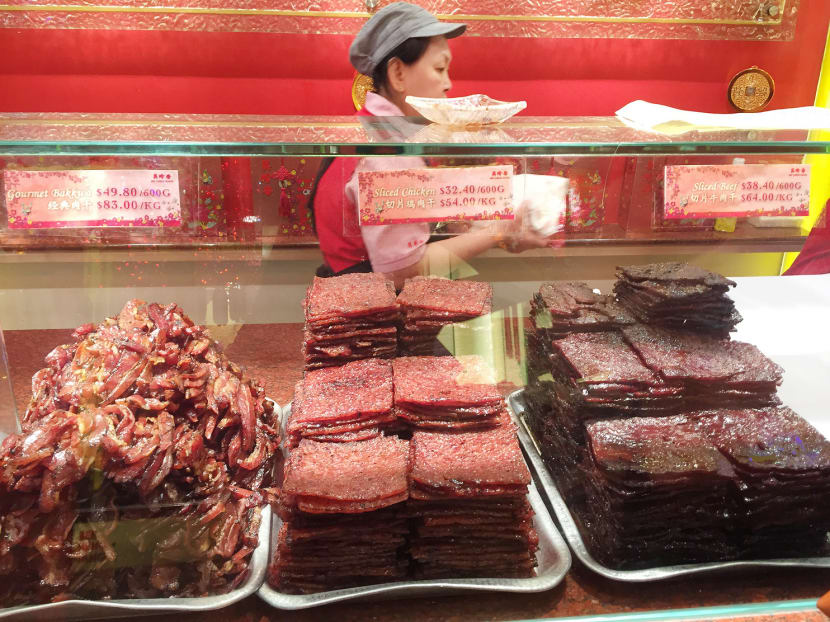Chinese New Year delicacies now cost up to 40% more
SINGAPORE — Those stocking up on popular Chinese New Year food items such as bak kwa and fish are feeling an extra pinch in their wallets this year, compared with the same festive period last year, with the Chinese silver pomfret seeing a 40 per cent additional jump.

Bak kwa prices have increased between four and 20 per cent within the last two weeks. Photo: Wong Pei Ting/TODAY
SINGAPORE — Those stocking up on popular Chinese New Year food items such as bak kwa and fish are feeling an extra pinch in their wallets this year, compared with the same festive period last year, with the Chinese silver pomfret seeing a 40 per cent additional jump.
At the market, the price for the Chinese silver pomfret has gone up from S$80 per kg — a common quoting price this time last year — to breach the S$100 mark.
Some fish vendors even expect the price of the seafood to go as high as S$150 per kg within the next two days, as Chinese New Year approaches. It usually goes for about S$50 a kg during the off-peak period.
Bak kwa prices have increased between four and 20 per cent within the last two weeks, according to checks by TODAY.
Mr Kenneth Lim, chairman of Punggol Fish Merchants’ Association, attributed the sharp rise in pomfret prices to the strong competition for the popular fish among suppliers from Taiwan, China, Hong Kong and Singapore, with them overbidding each other.
As for bak kwa, Lim Chee Guan, which has always attracted snaking queues ahead of Chinese New Year, increased its signature barbecue sliced pork price by 12 per cent, from S$50 to S$56. During the festive period last year, it upped the price by about 8 per cent.
At Kim Hwa Guan, the increase in its sliced pork price was the same as last year, from S$48 to S$58. However, the company chose to cushion the rise in its manpower and rental costs, by raising the price of its products at a faster pace.
Conscious of breaching the S$60 mark, Mr Ng Chiam Heng, who is now in charge of the family business, said the joint’s bak kwa prices had hit S$58 since Thursday last week.
In previous years, the price will hit S$58 only three days before Chinese New Year.
Bee Cheng Hiang increased its barbecue pork price by another S$2 to S$54, on top of last year’s S$2-price increase, as “materials (including its pork, which is imported from Spain) are expensive”, said Madam Tan Chiew Lian, one of the directors in the family business.
When asked if the price increase was justified, Consumers Association of Singapore’s executive director, Mr Seah Seng Choon, said CASE “strongly” encouraged retailers not to increase food prices excessively and profiteer from the festive period.
However, CASE recognises that prices will naturally go up according to the market forces of supply and demand.
In face of the hikes, “consumers should take note to shop around and look for food that is within their budget”, Mr Seah said. “Consumers should also buy only the essentials and put off unnecessary purchases as far as possible.”
Some businesses, however, have chosen to absorb the rising costs.
For example, Mr Yip Wai Keong, owner of a longtime traditional sausage stall, Chinatown Guangzhou, at the Chinatown festive bazaar, has not increased the price of his sausages even though his supplier has increased its price by S$1 per kg.
Ming Fa Fishball’s manager, Mr Jerome Lim, the manager of Ming Fa Fishball, said his company is also not planning to raise the prices of its goods for now, even though manpower, rental, and fish costs have gone up by 20 per cent collectively.








